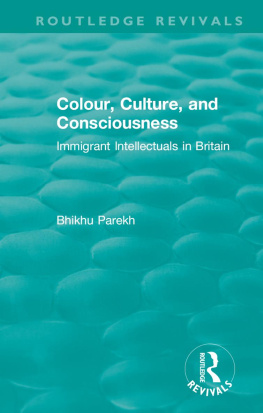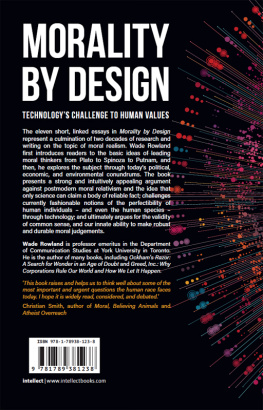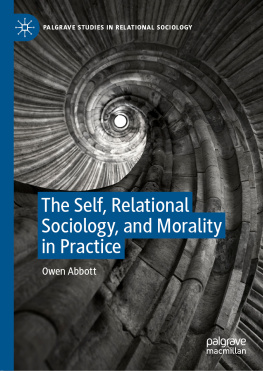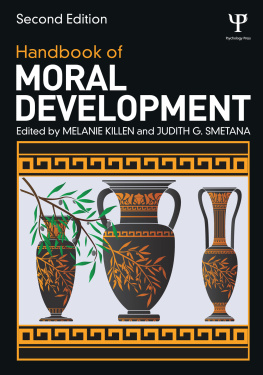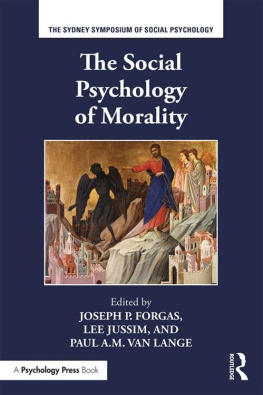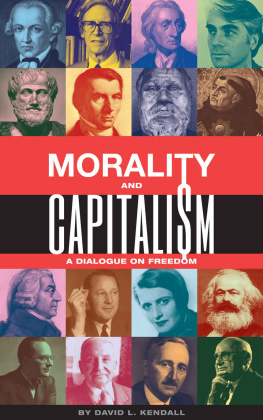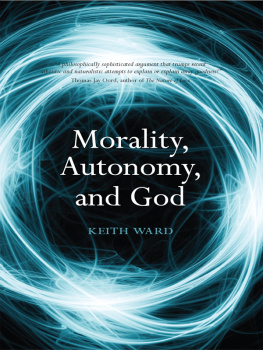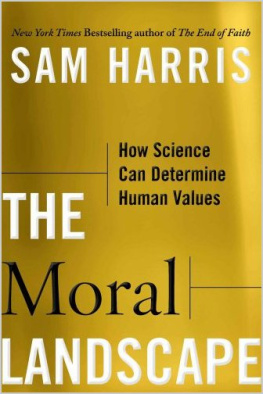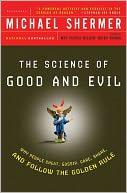Contents
List of Tables
Guide
Pagebreaks of the print version
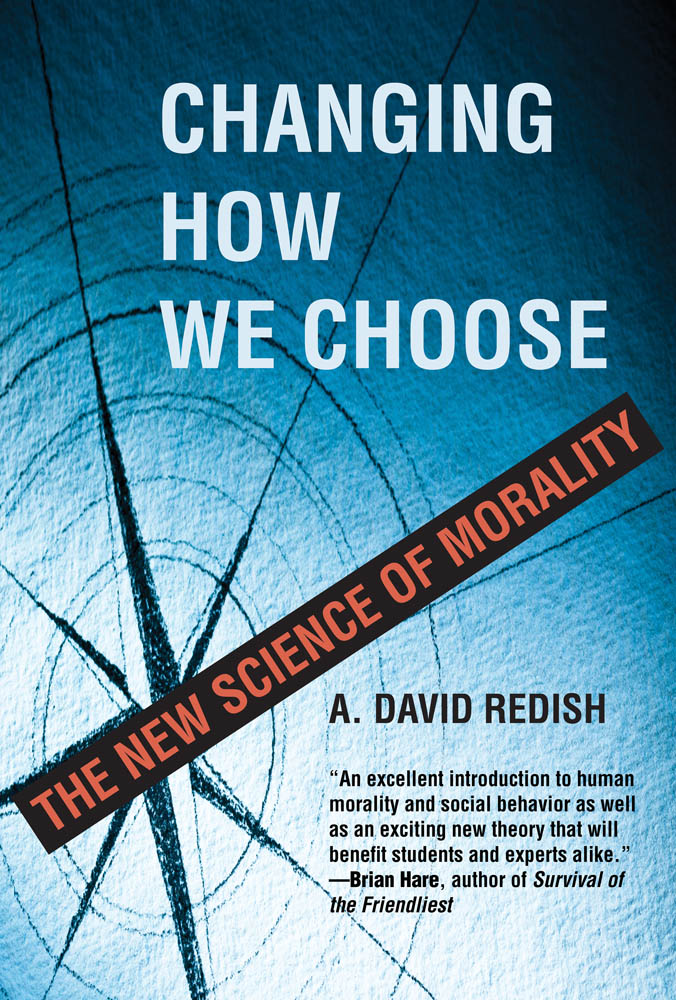
CHANGING HOW WE CHOOSE
The New Science of Morality
A. DAVID REDISH
The MIT Press
Cambridge, Massachusetts
London, England
2022 Massachusetts Institute of Technology
All rights reserved. No part of this book may be reproduced in any form by any electronic or mechanical means (including photocopying, recording, or information storage and retrieval) without permission in writing from the publisher.
The MIT Press would like to thank the anonymous peer reviewers who provided comments on drafts of this book. The generous work of academic experts is essential for establishing the authority and quality of our publications. We acknowledge with gratitude the contributions of these otherwise uncredited readers.
Library of Congress Cataloging-in-Publication Data
Names: Redish, A. David, author.
Title: Changing how we choose : the new science of morality / A. David Redish.
Description: Cambridge, Massachusetts : The MIT Press, [2022] | Includes bibliographical references and index.
Identifiers: LCCN 2021060558 (print) | LCCN 2021060559 (ebook) | ISBN 9780262047364 (hardcover) | ISBN 9780262371438 (epub) | ISBN 9780262371445 (pdf)
Subjects: LCSH: Decision makingMoral and ethical aspects. | Social ethics.
Classification: LCC BF448 .R39 2022 (print) | LCC BF448 (ebook) | DDC 170dc23/eng/20220517
LC record available at https://lccn.loc.gov/2021060558
LC ebook record available at https://lccn.loc.gov/2021060559
d_r0
Dedicated to all of my colleagues over the years in so many different fields who have worked with me, shared their knowledge with me, and welcomed me into their communities. I am better for having taken this journey with you.
We all do better when we all do better.
Paul Wellstone
Wont you be my neighbor?
Fred Rogers
Contents
List of Tables
The D-Day invasion as a matching pennies game
The iocaine powder game as Vizzini thinks it is being played
The real iocaine powder game that Westley is playing
The original (negative version) of the prisoners dilemma
The monetary (positive) version of the prisoners dilemma
The Golden Balls game as a prisoners dilemma
Ibrahims view of the split-or-steal game after Nicks declaration that he is going to steal
Nicks view once he knows that Ibrahim is going to split
The stag hunt game
The infrastructure frame of the assurance game
The problem of the commons
The monetary (positive) version of the prisoners dilemma
The problem of the commons
The payout matrix with no signal from the pirates
The payout matrix under the skull and crossbones
Dyadic punishment in the repeating prisoners dilemma
INTRODUCTION
1SEARCHING FOR A SCIENCEOF MORALITY
About ten years ago, I was flying on a plane back to my home in Minneapolis from some scientific conference and found myself sitting next to a pastor returning from a mission trip with his church. We got to talking, and the pastor and I had a fascinating conversation about science and morality.
My own research lies at the boundary between neuroscience and economics and studies how humans and other animals make decisions. My colleagues and I had discovered that people possess multiple decision-making systems, each of which uses information about the world in a different way. In a sense, humans are not unitary beingswe are multiple selves. And that fact explains a lot about how and why we sometimes find ourselves being inconsistent and taking actions that surprise us.
Some of our decisions depend on an explicit consideration of potential options and outcomes (called the deliberative decision-making system), while other decisions are made only after a lot of repeated practice (habits, also called the procedural decision-making system), and still other decisions are ingrained (species-specific, species-important) behaviors that we know how to do but learn when to release (we call these Pavlovian decision-making, but instinctual is probably a better word). Running away from a lion is Pavlovian, while hitting a baseball is procedural, and deciding where to go to college is deliberative. But it turns out that laughing with your friends is also Pavlovian, as is responding to unfairness.
My colleagues in this field of neuroeconomics had been studying economic gamesDo you share your resources with another? If another player in the game doesnt share with you, what do you do? If another player in the game cheats a third player, do you spend your own resources to punish them? Should you kill one person to save five? In a very real sense, these economic games asked moral questionsand my colleagues had made two important discoveries. First, many moral decisions depend on the Pavlovian system, not the deliberative, All of this meant that science was starting to get a handle on ways to study morality and to ask questions scientifically about it.
And I asked him, this pastor I had met on the plane, what he would do if (I think I said when) science is able to explain morality. He said he wasnt worried because he had faith that science would find that what it took to be a moral person was what religion had been arguing all alongthat we are all part of a community and that there are right and wrong behaviors within that community, based on helping others.
I had no idea how right he was.
WHERE THIS BOOK COMES FROM
My own research lies in the neural mechanisms of decision-making, looking at how we process information about the past (memory), present (perception), and future (potential outcomes and consequences) to take actions. We now know a great deal about how those decision systems make the choices they do, and we have found that how you ask someone to do something changes how each decision system responds and, thus, how that person responds to the question. Moreover, because each decision system processes information differently, how you ask someone to do something can even change which system drives the behavior.
Much of this research lies in the burgeoning field of neuroeconomics. Over the last decades, neuroeconomic experiments have discovered that these different decision processes influence moral decisions in interesting ways and interact with how humans cooperate. In particular, researchers have discovered that certain decision components include intrinsic goals of fairness and cooperation.
In step with this, over the course of the last decade I have been finding my research relating more and more closely to these questions and making connections to the literature on altruism, community, and third-party punishment such as that by Elinor Ostrom, Ernst Fehr, and David Sloan Wilson; to the neuroeconomic work examining the neuroscience underlying behavior in variants of economic games by researchers such as Josh Greene, Molly Crockett, and Read Montague; to the evolutionary and anthropological data from scientists such as Jane Goodall, Frans de Waal, Chris Boehm, and Michael Tomasello; and even to the moral philosophy of John Rawls and Tim Scanlon. I have to admit, I discovered Scanlons work (e.g., What We Owe to Each Other


